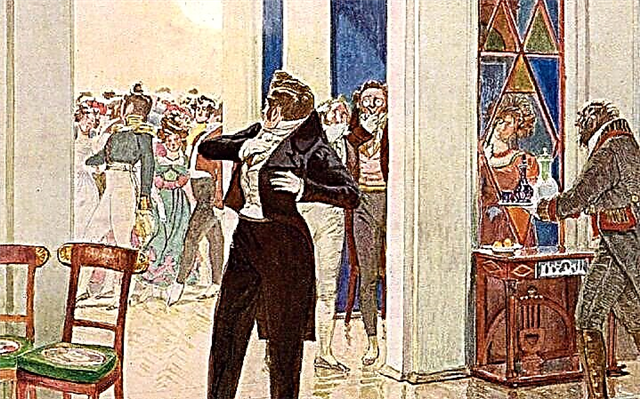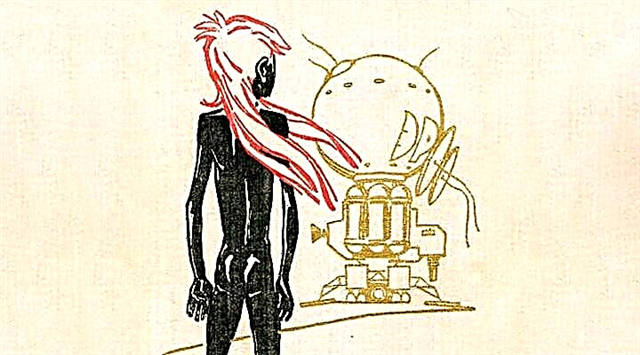Antiochus, king of Comagena, a region in Syria, annexed to the Roman Empire, who faithfully serves Titus and retains his royal title, is in love with Berenice. He has long been waiting for the opportunity to talk with Berenice and find out what her decision is: if she is ready to become Titus's wife, then Antiochus will leave Rome. When meeting with her, Antiochus admits that she has loved her all five years since meeting her, but Berenice answers him that she always loved only Titus and love is dearer to her than the power and crown of the emperor.
Berenice talks with her confidant Foinika, and she suggests that it will be difficult for Titus to circumvent the law. But Berenice believes in Titus and his love and waits for her to be greeted by the “arrogant senate”.
Meanwhile, Titus asks his confidant Pauline about what they think in Rome about him and Berenice. The emperor is not interested in the opinion of a servile court and nobles - they are always ready to endure any whim of Caesar, as they endured and approved of "all the baseness of Nero." Tita is interested in the opinion of the people, and Paulin answers him that even though Berenice is worthy of beauty as a crown, no one in the capital “would like to call her empress”. None of Titus’s predecessors violated marriage law. And even Julius Caesar, who loved Cleopatra, “could not call the Egyptian his wife.” Both the cruel Caligula and the "vile" Nero, "having corrected everything that people have been honoring for centuries," respected the law and "they did not see the vile marriage with them." And the former slave Felix, who became the procurator of Judea, was married to one of the sisters of Berenice, and no one in Rome would like to see the one whose sister had taken yesterday’s slave as husband. Titus admits that he struggled for a long time with love for Berenice, and now that his father has died and a heavy burden of power has lied on his shoulders, Titus must abandon himself. The people are watching him, and the emperor cannot begin his rule with breaking the law, Titus decides to tell Berenice about everything, he is afraid of this conversation.
Berenice worries about her fate - Titus' mourning for his father ended, but the emperor is silent. She believes Titus loves her. Titus suffers and does not dare to tell Berenice that he must abandon her. Berenice cannot understand what she has done. Maybe he is afraid to break the law? But he himself told her that no law could separate them. Maybe Titus found out about her meeting with Antiochus, and jealousy spoke in him?
Titus learns that Antiochus is going to leave Rome, and is very surprised and annoyed - he needs his old friend, with whom they fought together. Titus tells Antiochus that he must part with Berenice: he is Caesar, who decides the fate of the world, but is not able to give his heart to the one he loves. Rome agrees to recognize his wife only as a Roman - "any, miserable - but only by his blood", and if the emperor does not say goodbye to the "daughter of the East", then "in front of her the angry people will demand her expulsion." Titus asks Antiochus to inform her of his decision. He wants his friend, along with Berenice, to leave for the East and to remain good neighbors in his kingdoms.
Antiochus does not know what to do - to cry or laugh. He hopes that on the way to Judea he will be able to persuade Berenice to marry him after Caesar rejected her. Arshak, his friend, supports Antioch - he will be next to Berenice, and Titus is far away.
Antioch tries to talk with Berenice, but hesitates to say directly what awaits her. Feeling something was amiss, Berenice demands frankness, and Antiochus informs her of Titus' decision. She does not want to believe and wants to learn everything herself from the emperor. Antiochus now forbids approaching her.
Before meeting Berenice, Titus thinks what to do. He is only seven days on the throne after the death of his father, and all his thoughts are not about government affairs, but about love. However, the emperor realizes that he does not belong to himself, he is responsible to the people.
Berenice appears and asks him if she was told the truth? Caesar replies that no matter how hard it is for him to make such a decision, they will have to leave. Berenice reproaches him - he should have said about Roman laws when they only met. It would be easier for her to make a refusal. Titus replies to Berenice that he did not know how his fate would turn out, and did not think that he would become emperor. Now he does not live - life is over, now he reigns. Berenice asks what Caesar is afraid of - uprisings in the city, in the country? Titus replies that if the "customs of the father’s insult" causes unrest, then he will have to force his choice, "and pay for the silence of the people", and it is not known at what cost. Berenice suggests amending the “unrighteous law”. But Titus swore an oath to Rome "the law to keep him", it is his duty, "there is no other way, and we must follow it unshakably." It is necessary to keep the word, as its predecessors kept. Berenice, in despair, reproaches Caesar for believing that it is his supreme duty to "dig her grave." She does not want to remain in Rome "a fun for the Romans hostile and malevolent." She decides to commit suicide. Titus orders the servants to follow Berenice and prevent her from completing her plan.
The news of Caesar’s break with the queen spreads throughout the city - "Rome rejoices, every temple is open to the people." Antiochus in excitement - he sees that Berenice rushes about "in immense grief" and requires a dagger and poison.
Titus meets Berenice again, and she announces to him that she is leaving. She does not want to hear how the people are gloating. Titus answers her that he cannot part with her, but he cannot refuse the throne and abandon the Roman people. If he had done so and left with Berenice, then she herself would have become ashamed of “a warrior without regiments and Caesar without a crown”. Power and marriage with the queen are incompatible, but the emperor’s soul can no longer endure such torment - he is ready to die if Berenice does not swear to him that he won’t take over his hands.
Antiochus appears - for a long time he hid from Caesar his love for the queen, but he could not hide any more. Seeing how they suffer, he is ready for the sake of Caesar and Berenice to sacrifice his life to the gods so that they have mercy, Berenice, “cast into shame” by the greatness of the souls of both, seeing such a willingness to sacrifice Titus and Antiochus, begs them not to suffer so for her, she is not worth it. The queen agrees to live in separation and asks Titus to forget about her. She calls Antiochus to forget about love. The memory of all three will remain in the annals as an example of the most tender, fiery and hopeless love.











